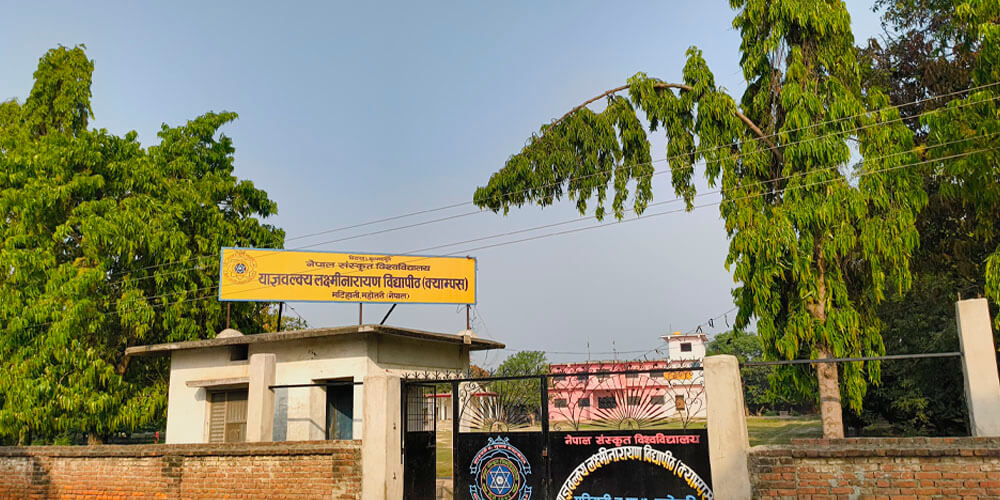
Yagyavalkya Lakshminarayan Vidhyapeeth (Yalana Vidhyapeeth), established in Matihani, Mahottari, to promote Sanskrit and Vedic education, is facing institutional decline. Concerned stakeholders have expressed dissatisfaction over its current state and urged the administration to adapt the institution to contemporary needs based on a review of its past performance.
Launching the campaign “Let’s Begin Dialogue,” the Progressive Professors’ Organization emphasized revitalizing the historical legacy of Yalana Vidhyapeeth while aligning it with modern educational demands. They called for a timely transformation to preserve its significance.
Lack of Coordination Highlighted by Municipal Authority
Hariprasad Mandal, Mayor of Matihani Municipality, stated that although a Sanskrit Vidhyapeeth exists in the municipality, it has failed to make an impact due to a lack of coordination. He clarified that the municipality had previously allocated a budget for the Vidhyapeeth’s holistic development, but the amount was frozen due to the institution’s failure to coordinate.
DPR Being Prepared for Embassy Submission
The mayor mentioned that a Detailed Project Report (DPR) is being prepared for submission to the Indian Embassy through Member of Parliament Mahantha Thakur. He urged institutional reform, noting that despite the current technological era, administrative work at the Vidhyapeeth is still performed manually. He advised developing a tech-integrated administration. Since the local government is the first responder before federal or provincial support, he stressed the need for coordination.
Principal Acknowledges Shortcomings and Resource Gaps
At the interaction program, Principal Hem Narayan Lal Karna stated that Yalana Vidhyapeeth is one of four original institutions established under the university, but has been unable to progress due to indifference and lack of support from the university. He mentioned that the staff number has decreased from 28 to just 8, limiting operational capability.
Staffing Shortage Hindering Functionality
The Vidhyapeeth comprises seven departments, which ideally should have at least one staff member each. Currently, only eight staff members are in service: two assistant administrators, one accountant, one storekeeper, and four general-level employees.
Technology Available but No Operators
Although the Vidhyapeeth possesses technology such as computers, printers, fax machines, projectors, and even three laptops with e-attendance systems, it lacks skilled operators to run them. The principal appealed to all stakeholders and the local government for support in addressing this issue.
Physical Infrastructure and Academic Environment in Poor Condition
The Vidhyapeeth is also struggling with deteriorating physical infrastructure, including hostel facilities, faculty housing, the library, administration, and the teaching-learning environment, as well as a low student population.
Sanskrit School Principal Expresses Frustration
Ishwari Paudel, Principal of the nearby Rajkiya Sanskrit Secondary School—Nepal’s first Sanskrit school—blamed poor coordination and lack of support for the decline of Sanskrit institutions. He noted that the school, previously running up to Grade 12, has now been limited to Grade 10. However, he affirmed readiness to resume Grade 12 classes with sufficient cooperation.
Missed Opportunities for Student Enrollment
Srikumar Mishra, Principal of Shreeram Secondary School, observed that better coordination would allow graduates from his school to enroll in Yalana Vidhyapeeth, potentially increasing student intake. Despite being located nearby, such collaboration has never materialized.
Former Principal Recommends Scholarship Reform
Former Principal Dr. Birendra Lal Karna suggested offering scholarships only to students who attend classes regularly to boost participation. He emphasized that quality cannot be achieved solely by relying on the university and called for support and coordination from both provincial and local governments.
Origins of the Institution: From Monastic Roots to Postgraduate Studies
Yalana Vidhyapeeth originated under the guardianship of Mahant Kaushalkishor Das of the renowned Lakshminarayan Monastery of the Vaishnav sect in Matihani. Established with private funding, it now offers studies up to Acharya (postgraduate) level.
Institutional Merger and Evolution
Under the new education policy, which mandates one Sanskrit campus per zone, the privately run Yagyavalkya Mahavidyalaya in Janakpur merged with Lakshminarayan Mahavidyalaya in Matihani in 2030 BS. It began operating from a separate building. Initially affiliated with Tribhuvan University, it became a constituent campus of Mahendra Sanskrit University (now Nepal Sanskrit University) in 2043 BS.
Historical Foundations of Sanskrit Learning
In 1801 BS, King Hemkarna Sen of Makwanpur established the Lakshminarayan Monastery. Devoted monk Tasmayya Baba initiated Sanskrit teaching under a pipal tree. By 1950 BS, grammar, Vedanta, and Ramayana studies were being taught. In 1968, BS, with the efforts of Mahants Banarsidas and Chatranath, subjects such as Veda, grammar, logic, and astrology were introduced.
Interaction Program Brings Together Stakeholders
The interaction event was chaired by Muktinath Jha, President of the Progressive Professors’ Organization at Yalana Vidhyapeeth. Professors, local political leaders, and students actively participated and shared their views on the institution’s revival.
Mahottari

